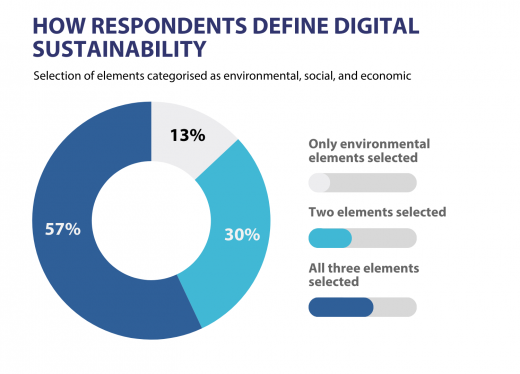Digital sustainability: about much more than just reducing CO₂
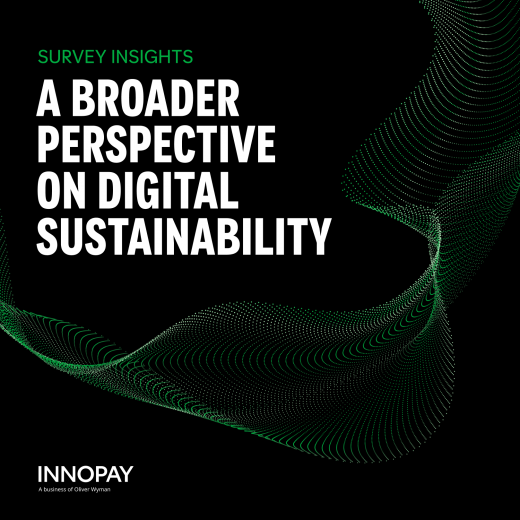
In today’s tense geopolitical and economic climate, digital transformation is under increasing scrutiny - not only for its efficiency, but also for its ethics, inclusivity, and long-term impact. As policymakers across Europe push for more regulation around AI, data use, and green IT, organisations are being called to take a more comprehensive approach to sustainability. While reducing CO₂ and managing energy consumption remain critical, our recent European digital sustainability survey reveals that professionals increasingly view digital sustainability as a much broader concept. It’s no longer just about ‘going green’ - it’s about ensuring digital progress aligns with societal values, responsible governance, and future-proof economics.
A broader perspective on digital sustainability is emerging
The survey was conducted in the period March/April 2025 among professionals from both the public (37%) and private sectors (63%) in Europe, representing a wide variety of organisations in terms of size and sectors. Participants were asked to select elements they associate with digital sustainability.
Analysis of the responses revealed that only a small fraction (approximately 13%) of respondents view digital sustainability through a purely environmental lens by focusing on elements such as energy consumption or carbon footprint reduction. In contrast, the majority of respondents selected elements across all three dimensions of digital sustainability: environmental, social and economic.
These results indicate a broader and more holistic understanding of the topic of digital sustainability, with respondents recognising its multi-faceted nature. This is a sign of the growing awareness that digital sustainability is as much about things like ethical data use, accessibility and long-term value creation as it is about energy efficiency or carbon emissions. This integrated perspective is increasingly seen as essential to creating digital systems and strategies that are truly sustainable in the long term.
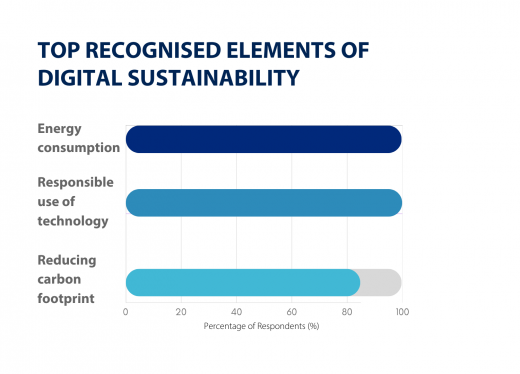
What does digital sustainability really mean to people?
While energy consumption and the carbon footprint are two of the three most frequently recognised elements of digital sustainability, the third element is the responsible use of technology.
This illustrates that although ecological concerns remain central, ethical digital behaviour is equally top of mind. It means that digital sustainability is not just about greener data centres or energy-efficient devices, but about ensuring that technology respects individuals’rights, includes all communities, and contributes to a fairer society.
For employees, it’s about working in organisations that uphold ethical data practices. For consumers, it’s about trusting that their digital lives aren’t exploited. And for society at large, it’s about shaping a digital future that is not only smart and efficient, but also just and inclusive.
How digital sustainability creates strategic opportunities
The survey responses underline that digital sustainability is not just a responsibility, but can also be seen as a strategic opportunity. This is especially true for the social dimension, with many professionals identifying inclusion, digital wellbeing and ethical technology design as areas where sustainable practices can create meaningful impact, both internally and externally. In terms of the positive economic aspects, respondents highlighted innovation, resilience and long-term thinking as essential elements of a digitally sustainable organisation. These are not only aligned with profitability, but also with future-readiness.
Just some of the numerous and wide-ranging examples of futureproof digitally sustainable practices mentioned by respondents include ‘more transparency for customers’, ‘data minimisation’, ‘impact investments’, ’designing for long-term maintainability’, and renewable energy and recycling initiatives.
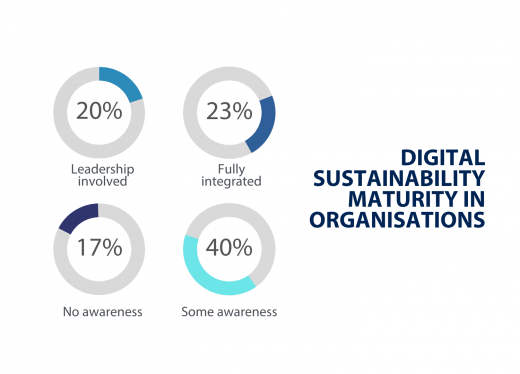
Where do organisations stand on digital sustainability?
When asked to reflect on the maturity of digital sustainability within their own organisations, respondents mainly painted an optimistic picture of early-stage progress, with only 17% of them indicating no awareness of the topic within their organisation.
Despite this optimism, the level of maturity across organisations remains relatively low. While 20% of respondents reported that leadership is actively involved and digital sustainability is gaining a foothold in strategic planning, most organisations are still at the awareness or early implementation stage.
Full integration into core decision-making is still relatively rare at just 23%.
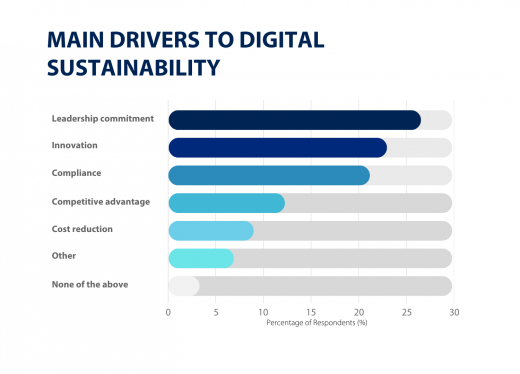
What drives organisations to act on digital sustainability?
Respondents identified several key drivers behind their organisation’s growing focus on digital sustainability. The top is leadership commitment. When digital sustainability is a priority for senior decision-makers, it gains visibility and support across the organisation. Other key reasons for accelerating digital sustainability-related action are the need to innovate, regulatory pressure and compliance requirements.
Organisations increasingly see digital sustainability as a driver of meaningful innovation - developing smarter, more efficient technologies that are not only environmentally responsible but also ethically sound and socially inclusive.
Increasingly, organisations are responding to frameworks such as the EU’s Corporate Sustainability Reporting Directive (CSRD), which requires disclosure of environmental impacts, including digital operations. Privacy regulations like the GDPR and upcoming AI Act also drive responsible data practices and transparent use of emerging technologies. Together, these frameworks elevate digital sustainability from a voluntary ambition to a compliance imperative.
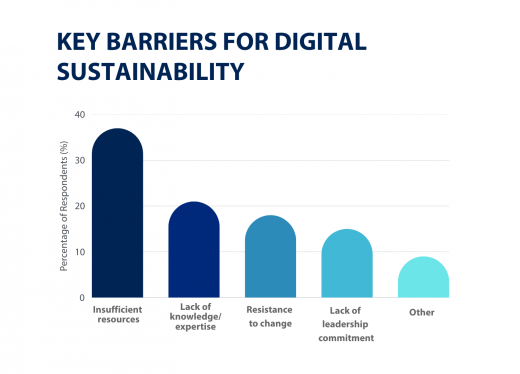
What’s preventing organisations from acting on digital sustainability?
While organisations increasingly recognise the importance of digital sustainability, turning that awareness into meaningful action remains a challenge. The most significant barrier is a lack of resources – particularly time, budget, and skilled personnel – which often stalls momentum.
Additionally, lack of in-house knowledge or expertise and internal resistance can hold organisations back. This underscores the need for practical tools, clear guidance and shared best practices to help organisations make progress.
Moreover, without leadership commitment and clear accountability, digital sustainability efforts are at risk of staying on the sidelines. To move forward, senior executives must not only make sufficient resources available, but must also invest them in the right people and culture to drive lasting change.
A universal concern
The survey respondents not only represented a wide variety of organisations in terms of size and sectors. Additionally, their own roles ranged from digital specialists to general management, showing that awareness is growing beyond traditional departments such as IT or sustainability. Digital sustainability is clearly becoming a cross-functional concern that touches nearly every part of an organisation: from procurement and operations to HR, communications and senior leadership.
This diversity suggests that digital sustainability is not only a shared challenge but also a shared opportunity. Recognising the cross-functional relevance of digital sustainability is key to building truly future-ready organisations. The challenge now is to move from recognition to action. By embedding digital-sustainability thinking into their strategic decision-making, organisations can stay optimally prepared in the fast-changing digital era, securing a competitive edge.
Need for a holistic approach
Current developments, ranging from climate targets and energy concerns to AI regulation and data ethics, demand a holistic approach to digital sustainability. When innovating, organisations should aim for solutions that not only reduce environmental impact, but also use data responsibly and inclusively, that is, in ways that protect privacy, prevent misuse, and ensure that diverse communities are fairly represented and benefit equally from digital systems. Likewise, efforts to reduce the environmental footprint of digital operations should be aligned with broader values: transparency, fairness, and long-term value creation.
Parallels can be seen with the early days of the IT revolution in the 1980s/1990s, when IT managers were part of the Finance or even Facility Management department, before the more comprehensive role of CIO had emerged. Today, organisations need to find a way of preventing fragmented approaches across departments to ensure coherent decision-making with regard to digital innovations, data and AI. Embedding digital sustainability into day-to-day digital decision-making promotes coherent strategies and helps translate awareness into tangible, measurable outcomes.
*This article is based on a digital sustainability survey conducted among 50 professionals from both the public and private sectors. Of the respondents, 37% work in the public sector and 63% in the private sector. They represent a wide range of organisational sizes and roles, offering a broad and diverse view of how digital sustainability is perceived and practiced today.



